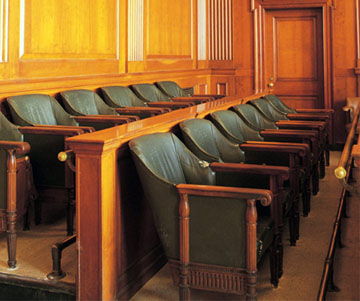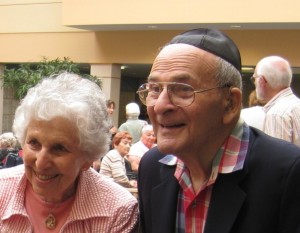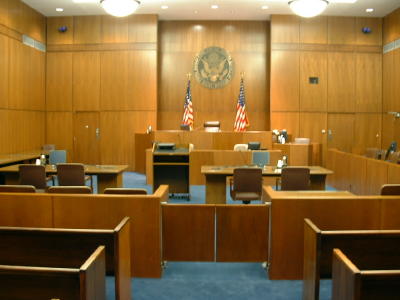
That’s right – I got selected for jury duty. Oh, the irony. I sat in the assembly room at the Criminal Justice Center from 8:30 A.M. til about 10:45 and got a lot of reading done. My panel of 40 finally got selected from the hundreds of people in the assembly room and we got taken up to the 10th floor. Instead of going into the courtroom, we waited, standing in line in number-order, for about thirty-minutes while another courtroom was cleared. That was not fun. We then filed into the courtroom and got introductory remarks from Judge Trent. Seems like a reasonable guy, but I’ve never appeared before him in my practice.
Since we were at the Justice Center, this was not going to be a civil case, but rather a criminal matter. That’s a bit outside my realm of expertise, but there was never any question that I would get bounced from the panel and sent home. The only question was how long it would take. By noon, the Judge let us go to an extended lunch. That didn’t help my prospects for a timely release.
As much as I tried to drag out my lunch, I still got back to the Courtroom at around 1:15. That left another 1/2 hour of doing nothing. And I forgot to mention – this was a pretty small case of drug possession with intent to distribute. That means the defendant had enough crack to subject him to a stiffer penalty. Normally, these cases resolve in a plea agreement of some kind, so I was at least curious to see why this one was being tried. Of course, I also realized that that was never going to happen.
At about 2:15 we got addressed by the Judge’s clerk and brought into the deliberation room. Remember, the jury hasn’t been selected yet. We were all still prospective jurors. Part of the long lunch break was used to interview the first ten panelists. My number was 21. After lunch, nos. 11-30 were jammed into the deliberation room that is supposed to comfortably accommodate twelve individuals, so it was a little tight. One by one we were called back into the courtroom to be interviewed about our ability to serve on this jury.
My number was selected after about an hour. I fell asleep at one point and started snoring loudly enough to wake myself up – embarrassing. Anyway, I finally made it into the room. I had no desire to serve on this jury, especially considering the two arbitrations I have tomorrow and a very important client meeting in a shooting case. But, having been the one selecting jurors a few times in the past, I also had no desire to try to manipulate the process. It was simply so unlikely that I would be selected, that there was no need to pull anything.
So I took my seat sometime after 3:15 and got very excited to finally have a speaking part. As someone who never shuts up, it was very hard for me to be quiet all day, so this was my big moment. It went something like this
Judge: Your questionnaire says that you or someone close to you is involved in law-enforcement or a law-enforcement related field. Please tell me about that.
Me: My wife works for the Public Defender.
Judge: Would that make it difficult or impossible for you to render a fair verdict in this case?
Me: No.
Judge: I notice from your questionnaire that you are an attorney. What kind of law do you practice?
Me: Mostly civil litigation. My boss handles a lot of criminal cases, so I come to this building from time to time, but I have never tried a case here.
Judge: Is there anything about your work or your boss’s work that would make it difficult or impossible for you to render a fair and just verdict in this case?
Me: No.
Judge: Thank you. Please go into the other room and my personal assistant will be in to speak with you in a minute.
I was alone in a small room that had a bunch of juror badges that led me to believe that, even after talking to 21 of us, these attorneys had not yet chosen more than four of their twelve jurors. As is often the case, jury selection was going to take longer than the actual trial.
I thought for a moment that I was going to be given one of those badges, but a moment later the Judge’s assistant came in and informed that i was done with that room for the day, but that I should go back to the assembly room, where I might be selected for another panel. That meant more waiting, but at this late hour, I was pretty sure I wouldn’t have to go to another room.
Back in the assembly room, I waited a while longer and finally got my check for $9 and went home.
I realize people don’t want to go through this process and don’t want to sit trough a boring trial. I feel like it’s a good exercise for me to see how it feels to hurry up and wait and then be forced to stand in a hallway with no knowledge of when we’re going to be allowed to move or why we are standing there.
Jurors are so important to criminal and civil litigation. The prospect of taking a case to a jury is the single biggest factor in getting people to agree. We never know what a jury will do and, fearing the unknown, we will do almost anything to avoid letting the jury decide our case. I only wish there was some way we could treat the jurors with more respect. I think that fear of the jury (or of what an individual juror may do) is a big part of why ‘the system’ treats jurors the way it does.




